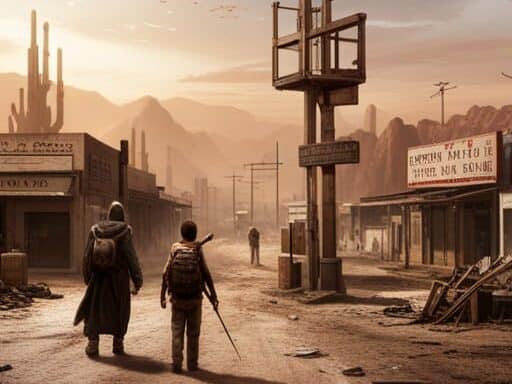Tropes are a common feature in many roleplaying games, including Rifts. They are recurring themes players and Game Masters can use to create interesting stories. Here are some tips to successfully use tropes in RPGs:
- Understand the tropes: Before you start incorporating tropes in your game, understand what they are. Take time to research common tropes and how they fit into your game’s overall story.
- Use tropes to enhance the story: Don’t use tropes just for the sake of using them. It becomes extremely cliche to have the outcome of a random encounter roll always the worst it can be. Or to have a failed skill or attack roll the direst result possible. Those are two examples of crit failure tropes introduced years back in DnD. A single moment may be funny, appropriate, etc, but always is tiresome, boring, and a waste of everyone’s time.
- Balance the use of tropes: Tropes can be useful, but they can become predictable and cliché if overused. Balance the use of tropes with your own ideas to keep the game fresh and exciting.
- Create unique twists on tropes: Mix and match tropes so they are less likely to be recognized but still fun when they are. The Hero trope is what makes most players roleplay, but what about a hero from the backwater farm(not that uncommon), or a hero slave(also not uncommon-what can you create)?

Using tropes in RPGs tip 1
Understand the tropes: common tropes
Some tropes are done-to-death, while others are sprinkled here and there. These tropes listed are common ones in the Rifts Roleplaying game and many in general.
- The Post-Apocalyptic Trope: Rifts is set in a post-apocalyptic world, where the Earth has been devastated by catastrophes, magical, technological, and environmental. This is central and sets the tone for the entire game world.
- Mutants: Rifts has a variety of mutants, races who have been genetically altered by exposure to magic, radiation, and other things. This trope allows players to create unique characters with special abilities and powers.
- Cybernetics: Another popular trope in Rifts is cybernetics, allowing characters to replace or enhance their body parts with advanced technology. This ties into the game’s themes of technology and magic.
- Magic: Magic is a core part of Rifts(it’s what Rifts are made from) and is used by characters to cast spells, summon creatures, and perform other supernatural feats. This trope is often used to create fantastical and imaginative storylines.
- Mega-Corporations: Triax, Northern Gun, and Titan Robotics, are but a few powerful mega-corporations that use their vast resources to dominate the geo-political landscape of the world.
- Alien Invaders: The Rifts spewed out an unknown number of alien races onto Rifts Earth. From the Splugorth of Atlantis to Pirate Slavers like the Horune, to invading forces of Archons in South America. There are over a dozen Megaversal threats that risk bringing humanity past the brink of extinction.
- Heroes of Destiny: This is the most common trope amongst all roleplaying games. It is often assumed that the players are above average which is why they choose to be adventurers. You can play this idea up to an extreme level in Rifts all the way up to playing Demigods, Godlings, Cosmo-Knights, and other super-powerful races/classes.
- Lost city: With this trope, your party is out to discover a long-forgotten city or civilization. In the Rifts dimension books, there are many races talked about that fit into this trope. You can create cities of all kinds with few dangers, all the way up to large cities decimated by major threats like an ancient dragon, lich, Elder Races(in Rifts), or anywhere in between.
- First contact: How many movies and TV shows can you think of where the actors are portraying “First Contact” with a hidden or newly discovered species? Star Trek is a popular example that comes to my mind. This can be a great tie-in with a lost city trope also. New races can become great allies or terrible enemies.
- Deities: This is a really popular element included in fantasy-themed roleplaying games that include Gods, or at least beings worshipped like gods.
- Supernatural: You can break this down to include dragons, demons, fairies, witches, and the list goes on. You can argue this trope is even more popular than the “heroes of destiny” trope. Depending on the game setting supernatural elements can be only NPCs(Call of Cthulu typically), while some allow players to make characters out of them(Rifts, World of Darkness, Pathfinder, DnD, but each in different degrees).
- Prophecies: Whether it self-fulfilling prophecy or just prophecies in rumor this can be a great way to help unfold a campaign idea. In Rifts, it’s fairly easy to use psychic players as a medium of vision to give them clues. Your player’s actions can either help make them come to pass or not. They can just be a good way to get an adventure or an entire campaign going.
- Heroic last stand: What better way for the players to end a long campaign than to have a glorious last stand against their major enemy? Or at least that’s a popular way to have games go. Do with it as you please. I think better uses for it are the noble commoner standing for his family and the like. Simple folk standing up for themselves in a world they have no of surviving.
- Superhero entrance: This can take many forms like the standard “superhero landing” Hulk and other strong characters use. Think of how Tony Stark as Iron Man is often shown moving really fast in a car when he’s brought into the movie. Batman is shown with an expensive suit and a really expensive car or high-rise building, Captain Marvel often has an imposing stance, etc.

Create endless heroes unlimited adventures with this article.
Using tropes in RPGs tip 2
Use tropes to enhance the story
The above tropes listed are just some of the possible options used endlessly in stories throughout time. Some readers will see it and think I missed more important tropes. Fair enough, I absolutely didn’t think of some that could (or should) have been listed. The idea was simply to give an idea of what tropes are and now we’ll move into how to use them to enhance a story.
- Decide its importance: Decide first how important the trope is so that players don’t get too consumed or under-involved in it. For example, you could use the superhero entrance when players start a new section in the campaign. Do this by having them describe their entrance to a city, town, or their favorite “after-action” Inn. The trope can be a fun atmosphere/flavor element to create memorable sessions or it can become an undercurrent for the entire game system(like the post-apocalypse Rifts setting).
- Introduce clues: For most tropes, you’ll want to come up with ways to introduce them. Including clues or descriptions that engage players‘ senses is a good way to start, and maybe continue its use. Those clues do not need to be overly complex, you could even draw upon existing movies to give players a stronger visual/mental reference.
- Establish details: If the trope has a specific location then you’ll want to flesh that out, like with the lost city trope. This isn’t always necessary to have done right up front but it often helps.
- Include challenges: All things we pursue in life have unexpected challenges pop up. Including some with your tropes gives players opportunities to roleplay, use skills, be creative, and have fun. These are all elements of roleplaying, but they can add to the story being presented to create moments players and GMs will remember.
- Reward players: Your players are more likely to leave a game when they don’t feel their actions are being rewarded. Help your players along as much as you can in small ways. You’ll be surprised how little bits of gold, experience for a good idea, a silly magic item with a minor power, or acknowledgment for service offered in the game could be to them.
Using tropes in RPGs tip 3
Balance the use of tropes
The saying “Less is more” applies to using tropes in your tabletop RPG games. If you start incorporating trope after trope then your game continuity is going to break. It will stop feeling like a game and more like some silly random story with no direction in mind.
Avoid using tropes too much that are outside the established themes already present in the game setting. If you are playing Dungeons and Dragons for example then you already have supernatural, heroes, and a few others mixed in. Adding others should be a conscious choice that complements the adventures, or campaign you have in mind.
Tips to balance trope use
- Avoid Overuse: First and foremost, can’t be overstated. Using the same trope repeatedly can make the game feel predictable and boring. Vary the tropes used and use them appropriately.
- Consider the Players: Some players may enjoy certain tropes more than others. Knowing your player’s interests and dislikes can help tremendously to make the trope choices memorable. Even if players don’t like them, don’t discount them. Find moments when they can be added tastefully in a way that the player expects but laughs at the same time.
- Gauge yourself: If you are the GM (or player introducing one for your character) it’s important to have a reasonable understanding of the trope you want to use. If you are just throwing one in because it sounds good but doesn’t know it well then it may conflict with your player’s understanding of it. Essentially this will ruin the experience you intended to create.

Using tropes in RPGs tip 4
Make your own tropes
You are a totally different person than anyone else. You’ve had different experiences and ideas than others have had. This puts you in a great position to tweak, twist, and alter existing tropes in your own way, so do it. Put your ideas into the game you are making, that’s the entire reason behind creating adventures.
Tropes are no different.
Just because certain tropes are super popular doesn’t mean you can’t put your own twist on them. In fact, doing so in the context of your own game is the perfect way to introduce them. Especially with players you have been gaming with for a little while.
The comradery and connections between you all will help deepen those connections into long-lasting memories.
A few ways to create your own tropes
- Change expectations: Instead of having a dragon encounter turn into a fight, turn it into an ally seeking help. Or the Lich can turn out to be an Elf that gave his life up to defend a powerful artifact from other evildoers.
- Ham up the trope: Some tropes are very general. Turn them into extreme examples. The common farmer could be the most charismatic person around but refuses to do anything but be a farmer. Make really interesting characters out of unexpected NPCs, or amazing dungeons out of what would normally be normal, etc.
- Add/remove as you see fit: A lot of what is written is in some way related to ideas already written. So add new elements to make it different for your game. Remove elements when desired as well. Forget about right/wrong, good or bad. If it adds the flair and flavor you are looking for then that’s good enough!
